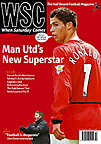 Who knows what lies in store for Chelsea as fun time with Roman beckons
Who knows what lies in store for Chelsea as fun time with Roman beckons
By now we will all be agreed that any newspaper which describes to the occupants of Stamford Bridge as “Chelski” should be referred to the Press Complaints Commission and sternly censured with, at least, a swingeing fine. Short custodial sentences and history lessons, meanwhile, ought to be the norm for anyone using the term “Red Roman” for a man described on his takeover of the club as “the real financial genius of Russia’s bandit-capitalism epoch” – Ken Bates is more leftwing.
Some may be weary of it already, but the signs are we will be treated to detailed reports of Roman Abramovich’s movements from every game he attends this season, which may be a lot if, as has reported, he intends to settle in London. “Who says he doesn’t care?” purred Richard Keys as the cameras picked out the “Siberian oil magnate” clenching his fists in delight as Jimmy Floyd Hasselbaink scored the visitors’ winner at Anfield on the opening weekend of the season. Television viewers were treated to a slow montage of Roman’s reactions at various points in the game – head in hands when a chance was missed, a shrug at a penalty conceded, jubilant high fives with his besuited lackeys, two blonde women and, less pleasantly, Ken Bates at the end. All in all he seemed to quite enjoy himself, which is nice.
He had a thoroughly decent time too at Chelsea’s second match, against Leicester, signing autographs and pressing the flesh before the game at which home fans sang along to a recording of the Russian folk song Kalinka (the one from primary school music lessons that gets faster and faster).
Abramovich may yet get a chance to trade pre-match small talk with others whose fortunes come close to matching his own. Even if, so far, there has been a lot of talk but no action. Venezuelan media owner Gustavo Cisneros, described enticingly as the second richest man in South America, spent several summer weeks allegedly poised on the brink of takeover talks with first Aston Villa and then Spurs. Then there was talk of a Gulf sheikh preparing to take on the debts of Leeds United, though this now seems to have no more credence than the brief flurry of stories in the mid Nineties about the Sultan of Brunei and his alleged passion for Everton (which seemed to wither during the time that former Goodison stalwart Mick Lyons was employed as the oil-rich state’s national team coach).
But as clubs continue to pile up debts that would make even the most hardened bank manager weep, some, especially those looking to break into the top five, may conclude that they need the patronage of what FA chief executive Mark Palios recently described as “ethnic billionaires”, seeking the “fun” that is said to be Abramovich’s main motivation.
Of course, some good has come out of his spending spree. It has at least boosted what had been a dormant transfer market (Blackburn used a proportion of the Damien Duff money to buy Steven Reid from Millwall; Southampton, after selling Wayne Bridge, took Kevin Phillips off Sunderland’s swollen monthly wage bill). Manchester United’s cash, by contrast, has almost all gone abroad in the year since they acquired Rio Ferdinand. And it’s not as if Abramovich has come into English football as an asset-stripper – there is much more of a danger of that with mysteriously funded local businessmen in the lower divisions, as explained elsewhere in this issue.
But, like the fur-coated lower division chairmen of the 1970s who arrived on the pitch in a helicopter, Abramovich and the new money-men might go as quickly as they arrived. So please let’s not be asked to believe, on fawning TV coverage, that these people and their hangers-on in their designer suits are real fans. They could just as easily be at Ascot cheering a horse past the winning post, or at a Formula One track. And one day, no doubt, that’s where they will be.
From WSC 200 October 2003. What was happening this month